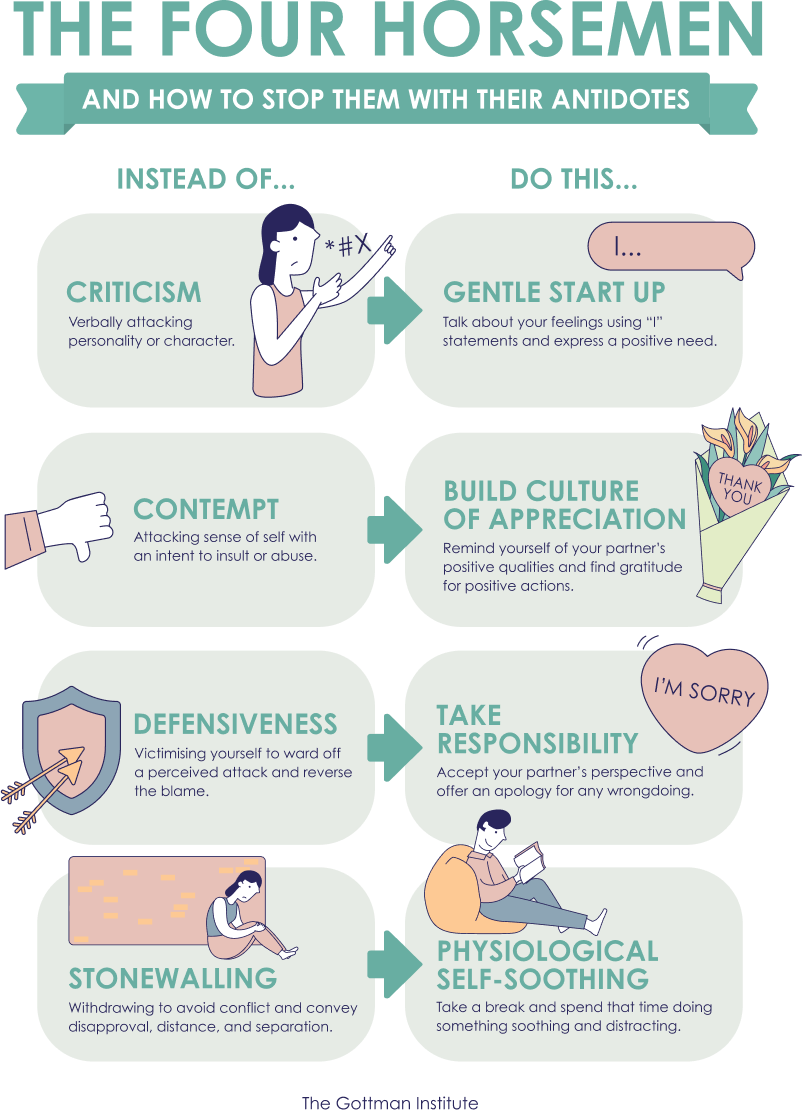Improving Communication
Tackle the four common communication pitfalls.

Improving Communication

Good communication is key to building understanding, trust, and intimacy in any relationship. However, this takes time and intentionality. Studies have shown that most people felt that their inability to communicate with their spouse was the main reason for the breakdown of their marriage. If you are looking to work on strengthening your marriage, improving communication between the both of you might be a good place to begin.
Dr. John Gottman, a psychological researcher and clinician, conducted extensive research of thousands of couples over 40 years and identified four common communication pitfalls. These pitfalls are frequently associated with highly stressed marital relationships. He calls these “The Four Horsemen”[1] and provides helpful suggestions on what couples can do to address them:

- It is often characterised by “you” statements.
- Unlike complaints, which are about specific issues or behaviours, criticism is an attack on your spouse’s character which makes them feel assaulted, rejected, and hurt. When criticism happens frequently and carries on for a long time, it can grow into contempt.
- Example of criticism: “You just make decisions without talking to me. Why are you always so selfish?”
Suggestion: Start your responses gently

- If you are unhappy about something in your relationship, express it by all means, but start your responses gently instead.
- Start your sentences with “I” instead of “you”. Express what you feel and what you need without blaming your spouse.
- Example: “I feel like I am not involved in this decision. Can we discuss this please?"

- Many people become defensive when criticised, which never helps to solve the problem.
- Defensiveness is really a way of blaming your partner – you are saying that “the problem isn’t me, it’s you”. As a result, the problem is not resolved, and the conflict worsens.
- Example of complaint: “Did you call your parents to let them know that we’re not coming tonight as you promised this morning?”
- Example of defensiveness: “I was just too busy today. You know how busy my schedule is! Why didn’t you just do it?”
Suggestion: Accept responsibility

- Accept responsibility for your role in the situation, even if only for part of the conflict
- Example of complaint: “Did you call your parents to let them know that we’re not coming tonight as you promised this morning?”
- Example of accepting responsibility: “Oops, I forgot. I should have asked you to do it this morning because I knew my day would be too busy. Let me call them right now.”

- Contempt shows up in statements that come from a position of moral superiority. Some examples of contempt include sarcasm, cynicism, name-calling, eye-rolling, sneering, mockery, and hostile humor.
- Contempt is destructive and defeating. It is the greatest predictor of divorce, and it must be avoided.
- Example of contempt: “You’re ‘tired’? I’ve been working the whole day and attending meetings back to back. Every time I come home, you are just watching TV. Could you be any lazier?”
Suggestion: Build a culture of appreciation

- Treat one another with respect in the relationship and express appreciation and affection often.
- If you express appreciation, gratitude, affection, and respect for your partner regularly, you will create a positive perspective in your relationship that acts as a buffer for negative feelings. The more positive you feel, the less likely you will feel or express contempt.
- Example: “I know that you start your day very early because you fetch the kids to school. I appreciate your effort in doing this for the kids.”

- Stonewalling happens in a discussion or an argument when the listener withdraws from the interaction, shuts down, and closes themselves off from the speaker because they are feeling overwhelmed. It is as if they are building a wall between them and their partner.
- Rather than confronting the issue, someone who is stonewalling will be totally unresponsive and evasive, such as tuning out, turning away, or acting busy.
Suggestion: Soothe yourself psychologically

- Decide with your spouse to pause the discussion for a 20-minute break. During the break, calm yourself down instead of dwelling on your negative emotions
- Example: “I am feeling too angry right now to keep talking about this. Can we take a break and come back to talk in 20 minutes? I think we can work things through more easily after I have calmed down.”
If you find that you are prone to experiencing some of the communication problems above, try using the tips provided and incorporate them into your everyday communication with your spouse. Studies have found that using these methods leads to a lower likelihood of marriage breakdown and help improve your relationship. Additionally, you may find it helpful to discuss these skills with your spouse so that both of you can support each other while practising the tips to communicate well.
Pause and Reflect
Do you and your spouse exhibit any of these communication pitfalls?
What are some things the both of you can try to do to improve your communication?
[1] The Four Horsemen – The Gottman Institute: Lisitsa, E. (2013, April 23). The four horsemen: Criticism, contempt, defensiveness, and stonewalling. The Gottman Institute. https://www.gottman.com/blog/the-four-horsemen-recognizing-criticism-contempt-defensiveness-and-stonewalling/
Lisitsa, E. (2013, April 26). The four horsemen: The antidotes. The Gottman Institute. https://www.gottman.com/blog/the-four-horsemen-the-antidotes/
Lisitsa, E. (2013, April 29). The four horsemen: Criticism. The Gottman Institute. https://www.gottman.com/blog/the-four-horsemen-criticism/
Lisitsa, E. (2013, May 13). The four horsemen: Contempt. The Gottman Institute. https://www.gottman.com/blog/the-four-horsemen-contempt/
Lisitsa, E. (2013, May 6). The four horsemen: Defensiveness. The Gottman Institute. https://www.gottman.com/blog/the-four-horsemen-defensiveness/

